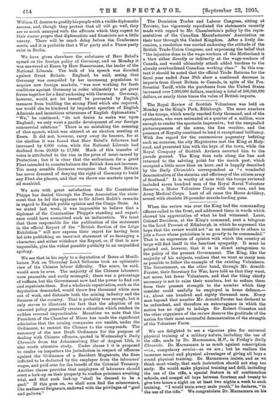We see that in his reply to a deputation of
Boers at Mosili- katses Nek on Thursday Lord Selborne took an optimistic view of the Chinese labour difficulty. The scare, he said, would soon be over. The majority of the Chinese labourers were peaceable and easily managed ; there was a percentage of ruffians, but the Government now had the power to find out and repatriate them. But a wholesale repatriation, such as the deputation demanded, would throw five thousand white men out of work, and dislocate both the mining industry and the finances of the country. That is probably true enough, but it only serves to illustrate the fact that the adoption of an unsound policy generally creates a situation which renders its sudden reversal impracticable. Meantime we note that the President of the Chamber of Mines has made the significant admission that the mining companies are unable, under the Ordinance, to restrict the Chinese to the compounds. The summary of the new Draft Ordinance for the purpose of dealing with Chinese offences, quoted in Wednesday's Daily Chronicle from the Johannesburg Star of August 12th, is also worth attentive study. Under clause 1 it is proposed to confer on inspectors the jurisdiction in respect of offences against the Ordinance of a Resident Magistrate, the fines inflicted to be deducted by the employer from the labourers' wages, and paid over for the benefit of the Colonial Treasury. Another clause provides that employers of labourers should erect a lock-up on their property to confine prisoners awaiting trial, and that such lock-up "shall be deemed to be a gaol." If this goes on, we shall soon find the mineowners, like mediaeval Seigneurs, endowed with the privileges of "gaol and gallows."










































 Previous page
Previous page